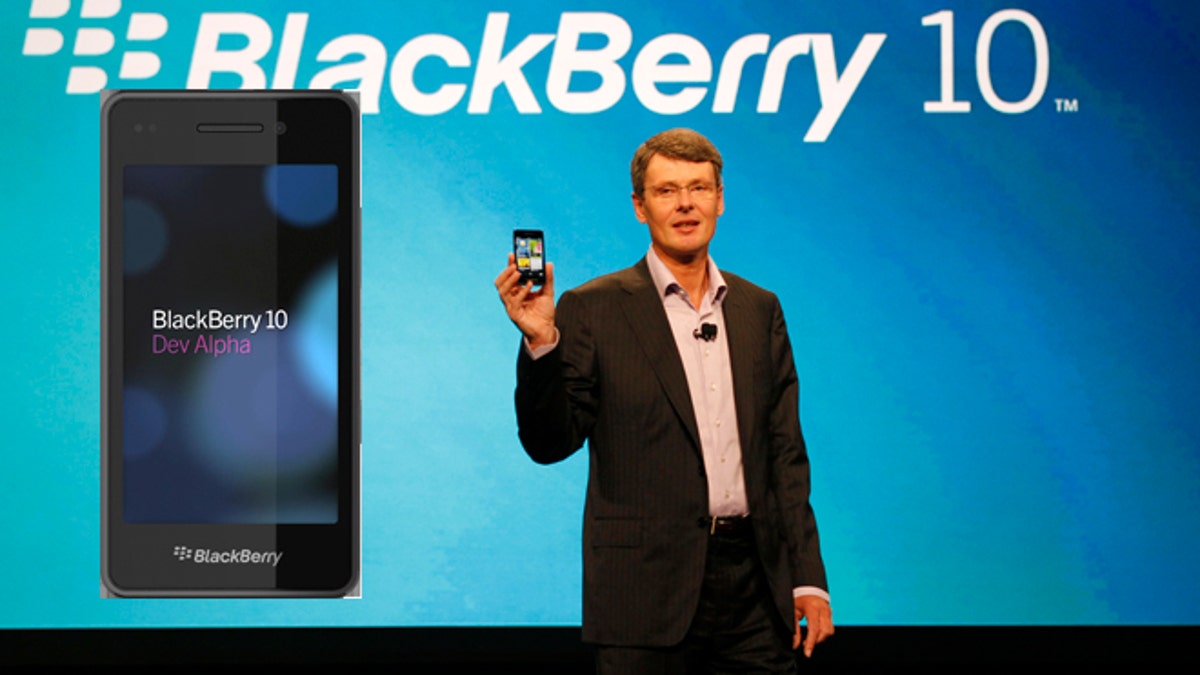
May 1, 2012: Thorsten Heins, president and CEO of Research In Motion, the company that makes BlackBerry, delivers the keynote speech during the BlackBerry World conference, in Orlando Fla. (AP Photo/Reinhold Matay)
When Research In Motion (RIM) unveiled the prototype of its upcoming BlackBerry last month, two features stole the show -- a predictive touch-screen keyboard and a camera that takes a series of near-instantaneous images for the perfect shot.
But unlike with earlier BlackBerry models, RIM did not design either tool -- it is licensing the technology from two different European developers. In fact, most of the device's critical features are a patchwork of hardware and software obtained quietly through about a dozen acquisitions and multiple licensing deals over the past two years.
The features include the device's interface, which allows a user to navigate through the phone's features, and the operating system itself.
[sidebar]
Buying up or licensing the latest technological gizmo is nothing new in the arms race that has broken out among the world's top smartphone makers. Apple bought the technology that powers its popular Siri voice-activation software. Other industry players -- from Google to Samsung Electronics -- regularly bolster their own devices and operating systems with deal-making.
- The 30 best apps for the new iPad
- Some LinkedIn, eHarmony passwords leaked online
- At universe’s edge, faintest distant galaxy spied
- Windows 8, tablets dominate massive Computex trade show
- As breakup with Apple looms, Google shows off some ‘magic’
- Internet grows by trillions of addresses, as IPV6 rolls out worldwide
But RIM has taken the strategy farther than most big players, at a crucial time for a company that practically invented the smartphone and once held unrivaled dominance over the market.
It also is a big departure for RIM, which once prided itself on its in-house engineering. That all changed as the iPhone and other popular smartphones overtook the BlackBerry as the mobile device of choice, leading RIM to look for outside help.
Now RIM executives are racing to sew together all of these pieces in time for the device's launch, expected this year. Converting to an entirely new operating system is an enormous task all by itself.
RIM also has to integrate the new technologies -- and the many employees -- of several smaller companies in globally-distant offices while shedding jobs tied to older phone models. It must cut costs associated with those older BlackBerrys while maintaining the services for existing users.
RIM licensed the camera technology of the new phone from Scalado of Sweden. UK-based TouchType makes the predictive touch-screen keyboard, called SwiftKey, which RIM licensed for the phone.
RIM also bought a host of other small companies whose technology is expected to help power or enhance the phones' video sharing, web browsing and messaging tools. Last month, RIM announced a licensing deal with Dutch company TomTom International to power traffic and map-related apps on BlackBerrys.
Read more about the new BlackBerry at The Wall Street Journal.








































